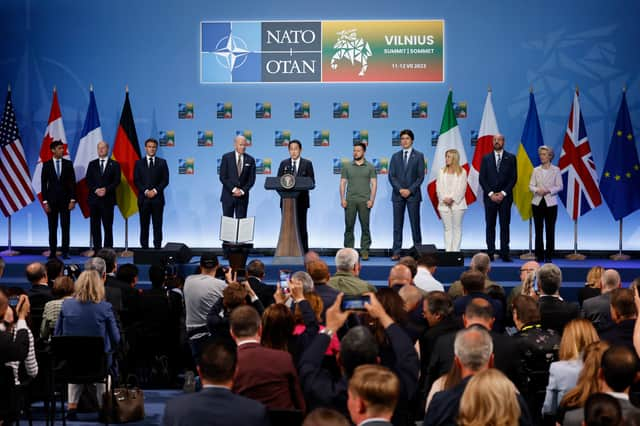NATO Summit 2023: what did NATO allies announce at annual meeting - what was said about Ukraine?


The 2023 NATO Summit has drawn to a close in Lithuania after world leaders gathered to discuss and take action on various pressing topics.
The two-day event was held in the Lithuanian capital of Vilnius from 11 July to 12 July. Those in attendance included US President Joe Biden, UK Prime Minister Rishi Sunak, French President Emmanuel Macron and many other.
Advertisement
Hide AdAdvertisement
Hide AdOne of those who made a high-profile appearance was Ukrainian leader Volodymyr Zelensky, who attended in-person to push the security alliance on several topics relating to Ukraine and the war with Russia.
New announcements were made around the membership status of many aspiring members, including Ukraine. A new security deal by G7 countries was also ratified at the summit.
Is Ukraine joining NATO?
The membership of Ukraine in the alliance has been a battle for the country which now finds itself at war with neighbouring Russia. NATO first signalled its intention to eventually welcome Ukraine into the fold at the 2008 Bucharest summit.
However, application processes can be lengthy and require unanimous agreement from all member countries before an applicant can be inducted. By the time Russia invaded Ukraine in 2022, Ukraine was gunning for membership but the alliance appeared less than keen to involve the country whilst they are at war.
Advertisement
Hide AdAdvertisement
Hide AdThis is due to Article 5 of the NATO charter - if one member of the alliance is attacked, all allied countries must come to their defence. Therefore, if Ukraine was to be made a full member while Russia continues its war on Ukrainian soil, all NATO members would be expected to declare war on Russia.
At the Vilnius summit, Zelensky made an appearance to urge the group not to hesitate on the decision any longer than necessary, although admitted that he understand the quandary the ongoing conflict puts the application in. He said: "Nato will give Ukraine security. Ukraine will make the alliance stronger."
The alliance has not backed down from its intention to allow Ukraine to join, but has not set out a timeframe for the application as of yet, a move which the Ukrainian leader has called "absurd". Zelensky was also told that his country would be able to join "when allies agree and conditions are met".
Sweden is the most recent country to be given the greenlight to join NATO, after Turkish President Recep Tayyip Erdogan ended the stalemate and announced his support of their application. The Scandinavian country is expected to follow in the footsteps of neighbours Finland, which joined the group in April, however Erdogan said that the membership will not be granted before October 2023.
What was in the G7 defence package?
Advertisement
Hide AdAdvertisement
Hide AdG7 countries ratified a new defence package for Ukraine during the two-day event. The long-term deal will further commit NATO's support to the Ukrainian fight against Moscow.
Included in the package was the commitment of defence equipment, military training and intelligence sharing.
The UK is said by officials to have taken a leading role in the creation of the new package. Upon the announcement, UK Prime Minister Rishi Sunak said: "We can never see a repeat of what has happened in Ukraine and this declaration reaffirms our commitment to ensure it is never left vulnerable to the kind of brutality Russia has inflicted on it again."
It comes after the US made the decision to send controversial weapons, which are banned in 140 countries to Ukraine. The country has sent cluster bombs - this weapon drops many smaller munitions when deployed, meaning that they can prove to be a risk in civilian areas.
Comment Guidelines
National World encourages reader discussion on our stories. User feedback, insights and back-and-forth exchanges add a rich layer of context to reporting. Please review our Community Guidelines before commenting.
